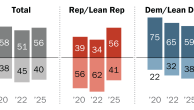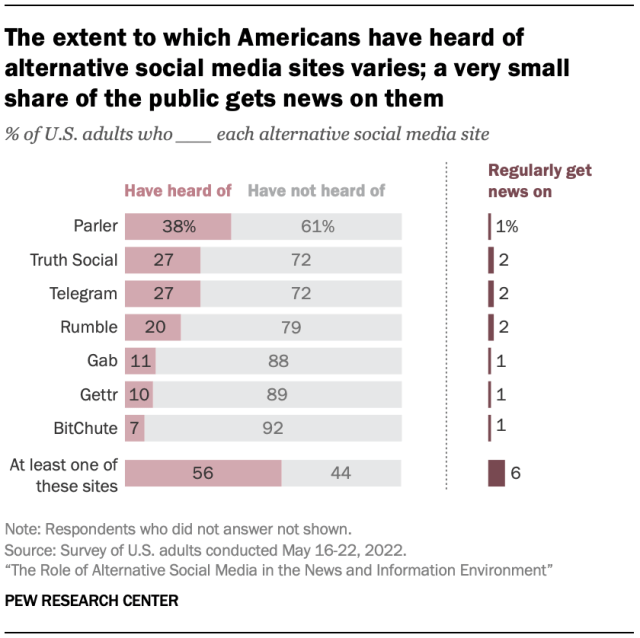
Overall, 6% of U.S. adults say they regularly get news or news headlines from at least one of seven alternative social media sites – BitChute, Gab, Gettr, Parler, Rumble, Telegram or Truth Social – according to a Pew Research Center survey conducted May 16-22, 2022.
Respondents first were asked whether they had heard of these seven individual alternative social media sites. Some are better known than others, but fewer than half of U.S. adults have heard of each of the seven sites. The public is most familiar with Parler: 38% say they have heard of it. About a quarter of Americans (27%) have heard of Telegram and Truth Social (which was founded by former President Donald Trump), while one-in-five have heard of Rumble and roughly one-in-ten have heard of Gab (11%), Gettr (10%) and BitChute (7%).
If respondents had heard of a site, they were then asked if they regularly get news there. The portion of Americans who get news from these alternative social media sites is very small across the board. For each of the seven alternative social media sites asked about in the survey, the share of U.S. adults who regularly get news there is either 1% or 2%. Altogether, 6% of Americans regularly get news from at least one of the seven alternative social media sites. By comparison, much larger shares of Americans get news regularly from Facebook (28%), YouTube (22%) or Twitter (14%), and 46% get news from at least one of these larger social media sites.2
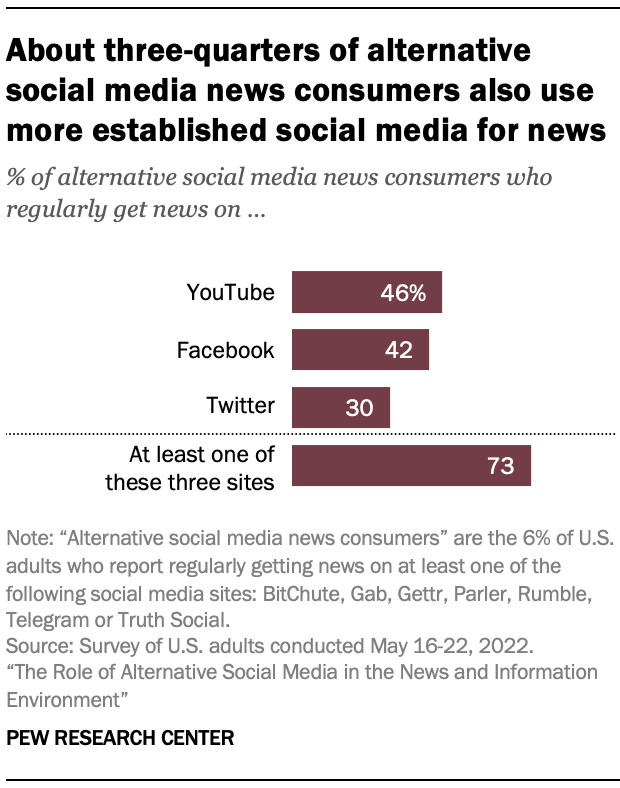
Although these sites were largely created to be alternatives to the more established social media sites, most Americans who have turned to them for news report that they also still get news on at least one of the more established sites. Indeed, about three-quarters of alternative social media news consumers (73%) also get news from YouTube, Facebook or Twitter – with 46% saying they regularly get news on YouTube and 42% on Facebook, slightly higher than the 30% who do so on Twitter.
People who get news on alternative social media commonly associate the sites with free speech, Big Tech alternatives and lack of censorship
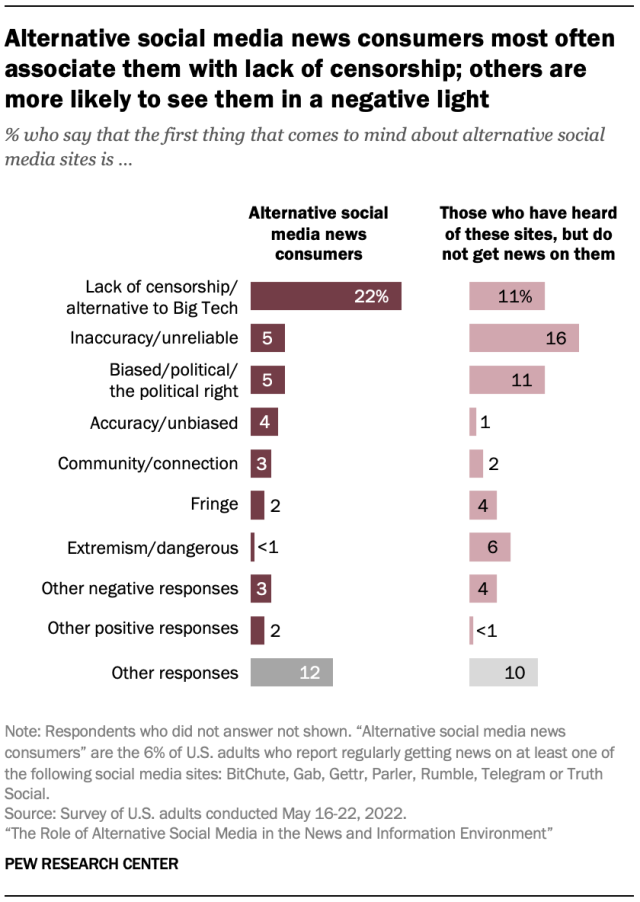
To get a sense of how Americans view these alternative social media sites, the Center asked respondents an open-ended question. If respondents had heard of any of the alternative social media sites, they were asked to write down the “first thing” that came to mind when they thought about the sites. Overall, the responses indicate that people who regularly get news from alternative social media sites perceive them in a more positive light than those who don’t.
The concept brought up more often than any other by people who use alternative social media for news is that the sites provide a sense of freedom of speech, a lack of censorship and/or an alternative to more established social media sites – similar to the terms these sites use to describe themselves. About one-in-five of those who get news on any of seven alternative social media sites (22%) said something related to these concepts. Examples of these types of responses include:3
- “They allow ALL political parties to have a voice without censoring personal or political parties.”
- “They are trying to deal with the destructive, disgusting censorship that has been the norm in this country.”
- “More freedom of speech (for the normal folk) but less popular (for the elites).”
Smaller portions of those who get news on these sites associate them with accuracy/being unbiased (4%) and community or connection (3%).
Other themes had a more negative connotation – such as inaccuracy, extremism or societal harm, and political bias – and were mentioned by small shares of alternative social media news consumers. But these topics were brought up more often by respondents who don’t get news on any of these sites (but who have heard of at least one of them).
For example, the concept of inaccuracy – including misinformation, conspiracy theories and unreliable information – was brought up by 5% of those who regularly get news on alternative social media sites, compared with 16% of respondents who have heard of these sites but do not get news there. Two respondents who do not regularly get news on these sites said:
- “I think too many of these sites are irresponsible and they can knowingly and unknowingly promote blatantly false information and/or propaganda.”
- “They aren’t a reliable source of information.”
Another 11% of those who don’t use these sites for news associate them with political bias or division, or just with the political right. And 6% of those who don’t get news from these sites say the sites bring to mind extremism and danger. For example, one respondent said that the first thing that came to mind for them regarding these sites is “extreme right wing/conservative and racist white supremacists, and the Jan. 6 riot.” Very few (<1%) of those who actually use these sites for news mentioned extremism or danger.
In a separate analysis, researchers marked which responses mentioned a political ideology. Few responses mentioned any kind of political ideology, but when they did mention one, it more often related to the political right. A small portion of those who have heard of – but don’t get news from – alternative social media sites mentioned the political right (14%), including conservatives and Republicans, while a smaller share of those who get news on these sites (6%) mentioned right-leaning ideology. Very few respondents mentioned the political left or any other political ideology.
Demographics of alternative social media news consumers
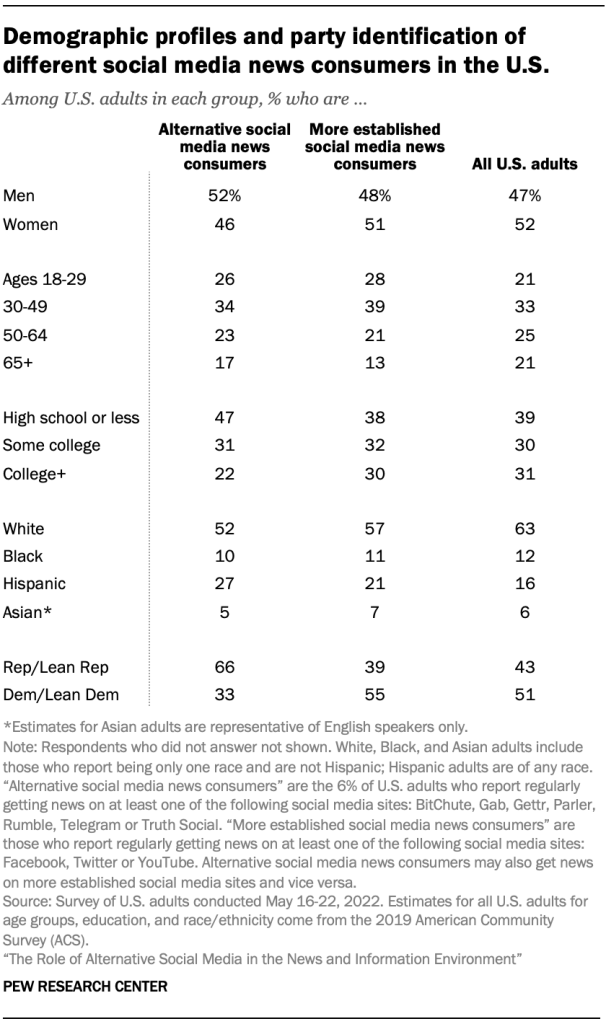
Overall, about two-thirds of those who regularly get news from at least one of the seven alternative social media sites (66%) identify as Republicans or lean toward the Republican Party. This is far higher than the share who identify as Democrats or lean Democratic (33%). In comparison, those who get news on at least one of the three larger social media sites – Facebook, Twitter and YouTube – are more likely to be Democrats or Democratic-leaning than Republican.
Most alternative social media news consumers find a sense of community on these sites, although some experience harassment
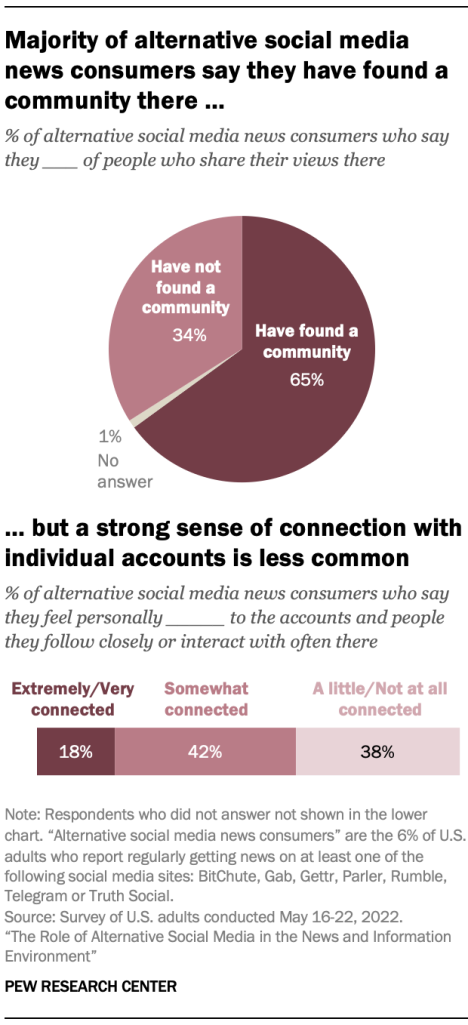
While many alternative social media news consumers say they have found a community on these sites, few say they have formed strong connections there.
Among the 6% of U.S. adults who regularly get news on at least one of the seven alternative social media sites asked about in the survey, roughly two-thirds (65%) say they have found a community of people there who share their views. But far fewer (18%) say they feel extremely or very personally connected to the accounts they engage with on these sites. An additional 42% say they feel somewhat connected to others on the alternative social media sites, while 38% say they feel only a little connected or not at all connected.
Meanwhile, roughly one-in-five news consumers on these sites (19%) say they have ever been harassed or abused there. About eight-in-ten (81%) say they have not had this experience.
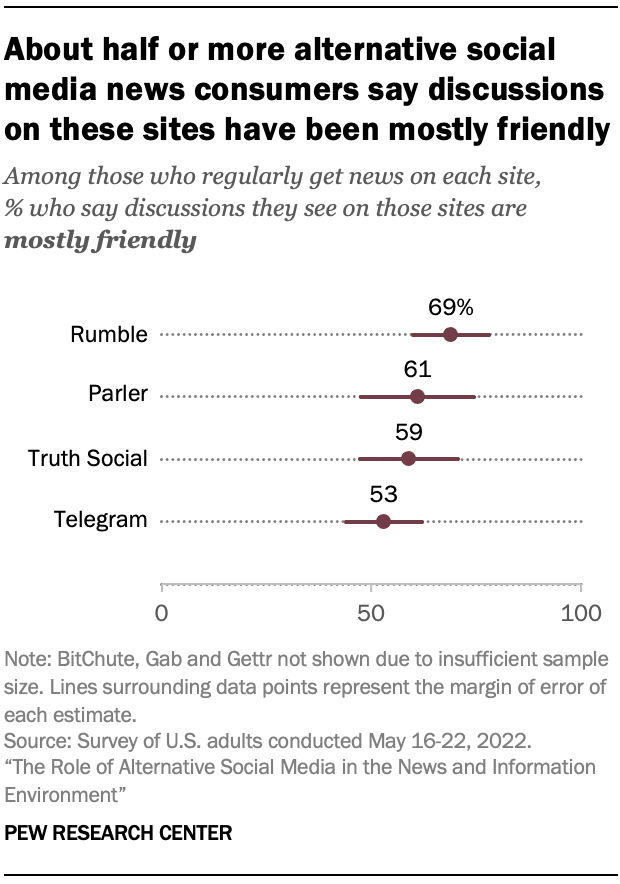
By and large, news consumers on Rumble, Parler, Truth Social and Telegram are more likely to characterize discussions there as mostly friendly as opposed to mostly unfriendly.
About seven-in-ten news consumers on Rumble (69%) say that discussions on the site are mostly friendly, as do about six-in-ten on Parler (61%) and Truth Social (59%) and roughly half on Telegram (53%).
Fewer news consumers in each site say the conversations they see there are mostly unfriendly.
Keeping up with current events is a key reason people use these alternative social media sites
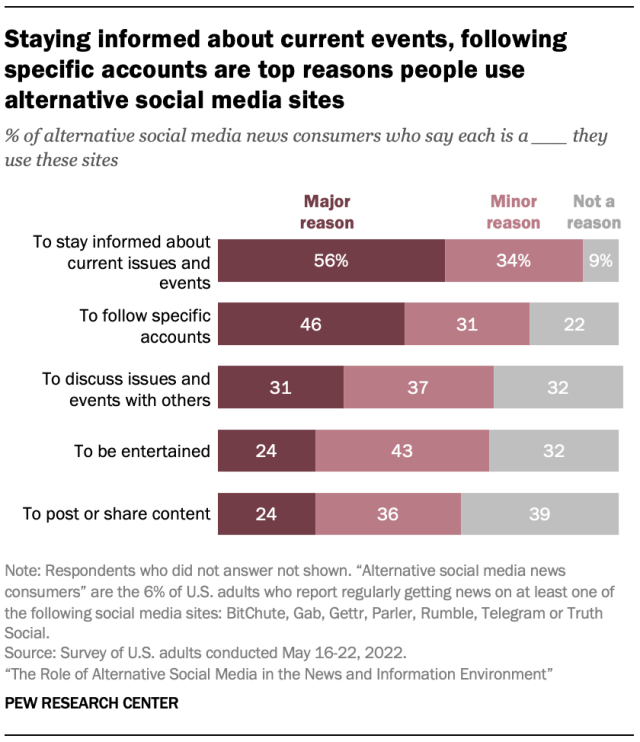
Overall, 56% of people who regularly get news on at least one of these seven sites say a major reason they go there is to stay informed about current events and issues, while 46% say following specific accounts is a major draw for them.
A smaller portion (31%) say discussing issues and events with others is a major reason they use these sites, while about a quarter (24% each) say being entertained or posting content is a major reason.
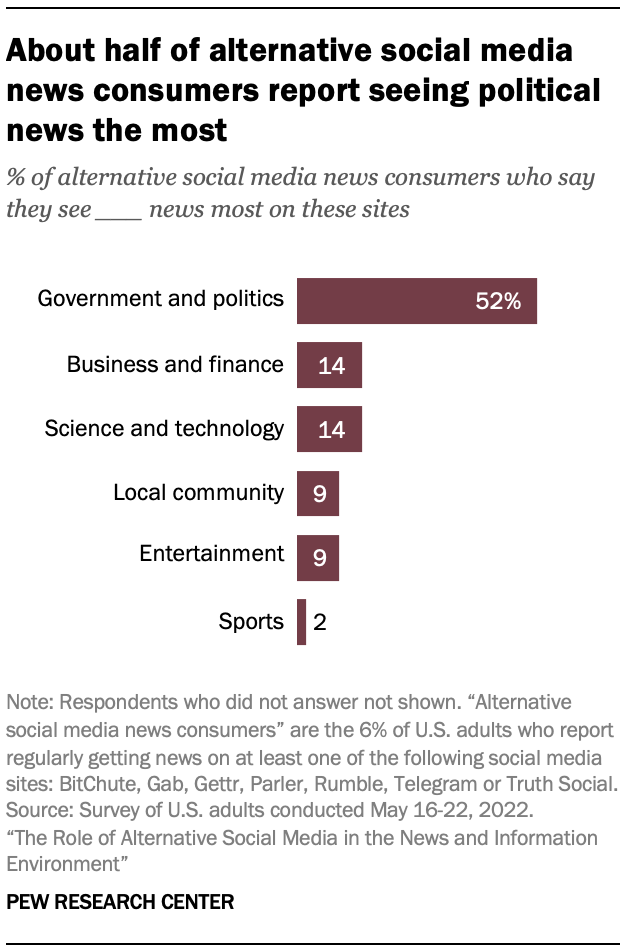
Government and political news appears to be the dominant news topic on alternative social media sites; 52% of regular news consumers on these sites say this is the type of news they come across most. That is followed by business and finance news and science and technology news (14% each). Roughly one-in-ten of those who get news on at least one of the seven sites – BitChute, Gab, Gettr, Parler, Rumble, Telegram or Truth Social – say they mostly see news about their local community or entertainment (9% each). Another 2% say they mostly see sports news.
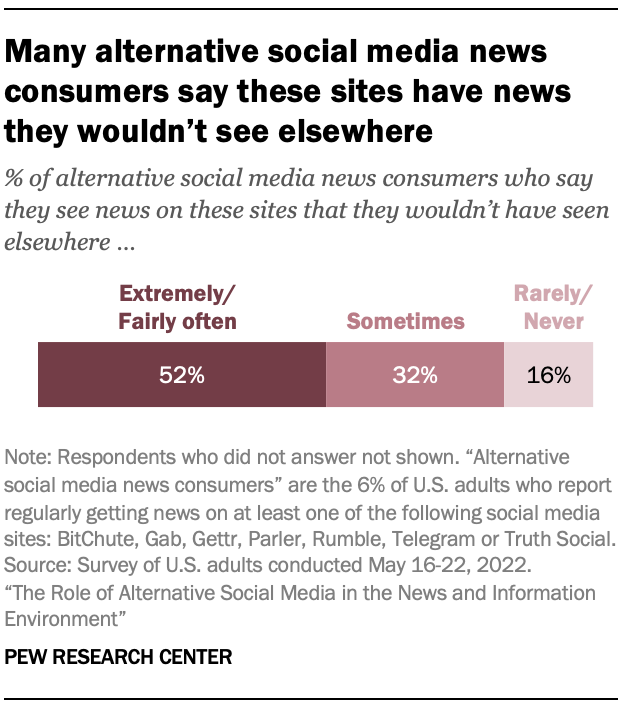
Consumers of news on these sites also sense a unique value in the content they come across there. Roughly half (52%) say that they extremely or fairly often see news on these sites that they would not have seen elsewhere. About a third (32%) sometimes do, while a smaller share (16%) rarely or never come across unique news on these sites.
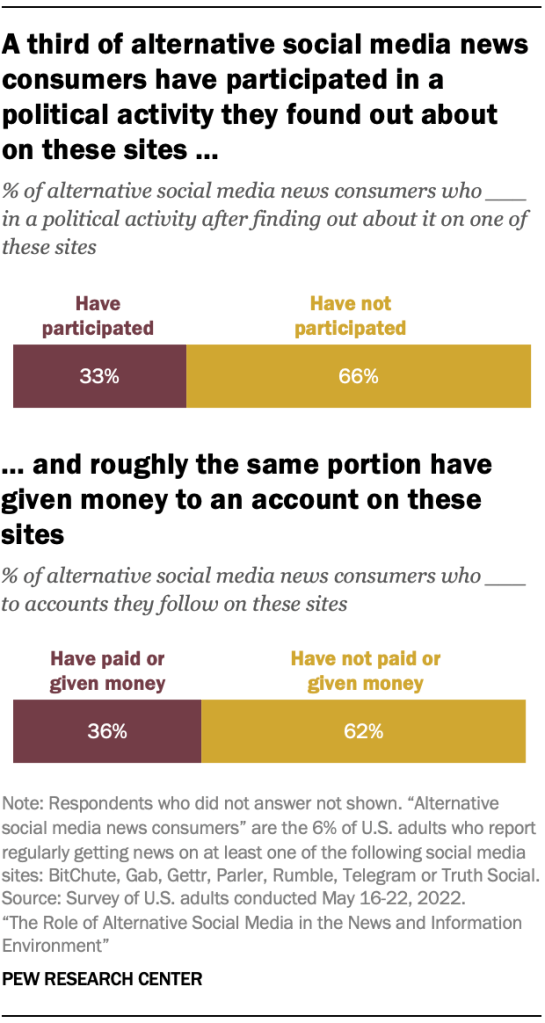
These alternative social media sites also at times lead people to offline activities. A third of those who regularly get news on these sites (33%) say they have participated in a political activity, such as a rally or in-person political discussion, that they found out about on these sites. And a similar portion (36%) report having paid or given money to accounts they follow on these sites by donating, paying for a subscription or purchasing merchandise.
Alternative social media news consumers largely opposed to tech company regulation of false or offensive content if it limits free speech
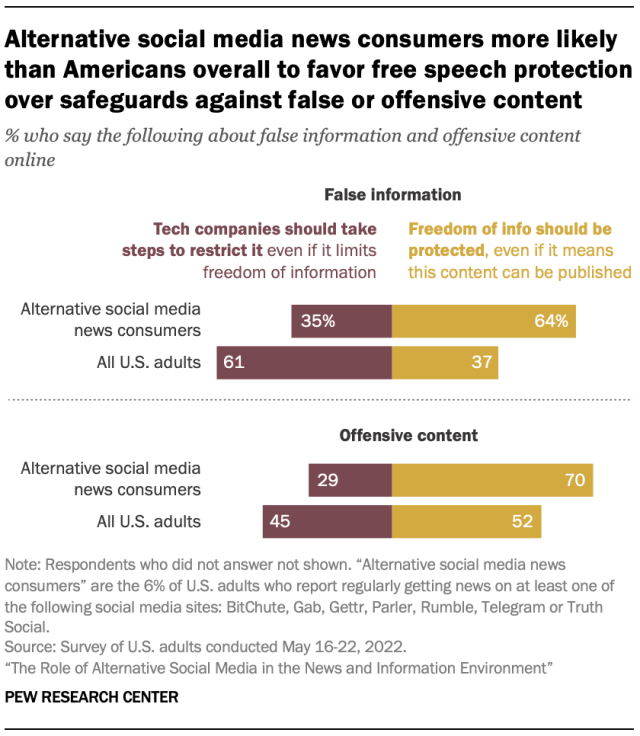
The steps, if any, that technology companies should take to manage controversial online content have been intensely debated among the public and governing bodies around the globe the last few years. This new study finds that the 6% of U.S. adults who regularly get news on at least one of seven alternative social media sites are broadly opposed to technology companies restricting both false information and offensive content online. Instead, they generally prefer that people’s freedom to publish and access content is protected, even if it means false and offensive material can be published. These views diverge from those of the public overall – and may help explain the appeal of these sites, which generally say they value free speech over censorship.
Close to two-thirds of Americans who regularly get news on alternative social media sites (64%) say people’s freedom to publish and access information should be protected, even it if means false information can be published. About a third (35%) choose the opposing stance – that technology companies should take steps to restrict false information online, even if it limits people’s freedom to publish and access content.
This is nearly the inverse of the general public’s views: 61% of U.S. adults say tech companies should take steps to restrict false information, while 37% say freedom of information should remain protected.
When it comes to offensive content, Americans overall are slightly more likely to support freedom of information over tech company restrictions. But again, alternative social media news consumers are more likely than U.S. adults overall to take this view. Seven-in-ten alternative social media news consumers say people’s freedoms to publish and access information online should be protected even if it means offensive content can be published, compared with 52% of Americans overall who share this opinion.
An in-depth look at four alternative social media sites finds users generally give positive assessments of their news experiences
In several key areas, U.S. adults who regularly get news on each of four alternative social media sites with large enough numbers to be analyzed individually (Parler, Rumble, Telegram and Truth Social) express positive overall evaluations of the news experience there.4
About half or more of those who get news on each of these four alternative social media sites are very or somewhat satisfied with the experience of getting news there – 67% of Rumble news consumers say this, as do 57% for Truth Social, 54% for Telegram and 52% for Parler. In each case, about a quarter or fewer say they are dissatisfied with the news experience on these sites, and the rest give a more neutral assessment.
Majorities of alternative social media news consumers also expect the news and information there to be mostly accurate. That includes about nine-in-ten regular news consumers of Rumble (88%) and Truth Social (87%), 75% on Telegram, and 69% on Parler.
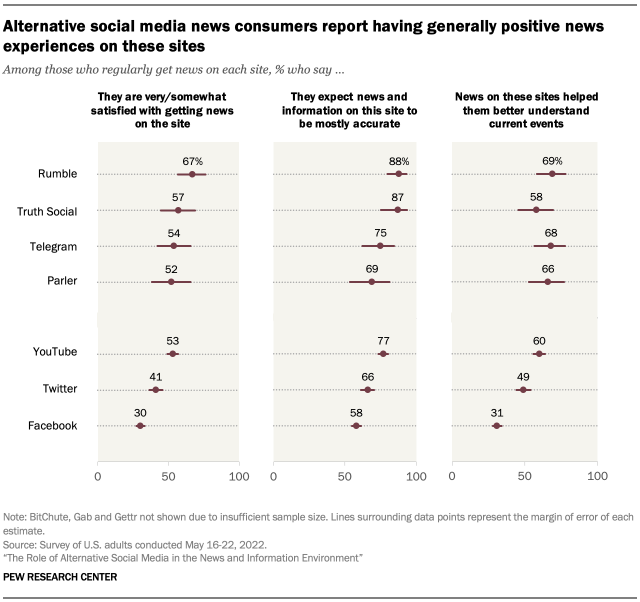
Similarly, when it comes to current events, more people who get news on these sites say they help to improve their understanding than say the sites make them more confused. That includes about two-thirds of those who use Rumble (69%), Telegram (68%) and Parler (66%) and 58% of Truth Social news consumers. The portion of news consumers on the four sites who say getting news there makes them more confused about current events is relatively low – ranging from 11% on Telegram to 17% on Truth Social.
Of the three more established sites asked about, YouTube consistently gets more positive evaluations from Americans who regularly get news there than Facebook and Twitter do from their own news consumers, often at similar levels as the alternative social media sites. The evaluations of Facebook are the lowest among these three, and often lower than the evaluations of the four alternative sites. Evaluations of Twitter tend to fall in the middle.
For example, three-in-ten U.S. adults who get news on Facebook say they are very or somewhat satisfied with the experience of getting news there – a smaller share than the news consumers who say the same on all four of the alternative social media sites.
Rumble and Truth Social news consumers are more likely than news consumers on both Twitter and Facebook to say that they expect the news there to be mostly accurate. While close to nine-in-ten Rumble (88%) and Truth Social (87%) news consumers say this, closer to about two-thirds or fewer of Twitter (66%) and Facebook (58%) news consumers do.
News consumers on all four of the alternative social media sites are more likely than those on Facebook to say that news on the site has helped them better understand current events – 31% of Facebook news consumers say this, versus about half or more of news consumers of these four alternative social media sites. And 49% of Twitter news consumers say this, a lower share than two of the alternative social media sites (Rumble and Telegram).
Finally, YouTube news consumers are in general on par with news consumers on the four alternative social media sites to be satisfied getting news there (53% say this), to expect the news on the site to be accurate (77%) and to say that the news there has helped them better understand current events (60%).
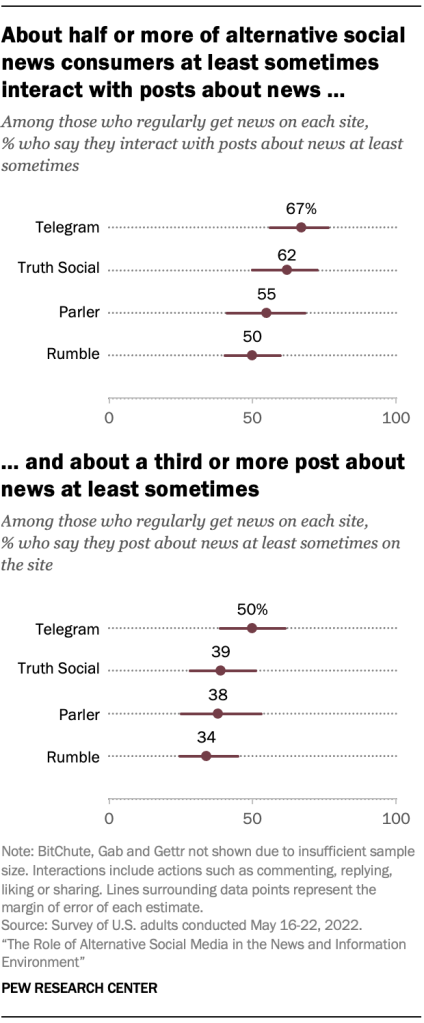
Many of those who get news on Parler, Rumble, Telegram and Truth Social interact with news posts; about a third or more post about news
Among Americans who regularly get news on Parler, Rumble, Telegram and Truth Social, about half or more say they engage in such actions as liking, commenting, sharing or replying to news posts on the site at least sometimes.
Of those sites, about two-thirds of regular news consumers on Telegram (67%) and Truth Social (62%) interact with news posts at least sometimes. The same is true of 55% of Parler news consumers and 50% of Rumble news consumers.
And about a third or more of the regular news consumers on these sites at least sometimes post about news themselves, including 50% of Telegram news consumers, 39% on Truth Social, 38% on Parler and 34% on Rumble.


